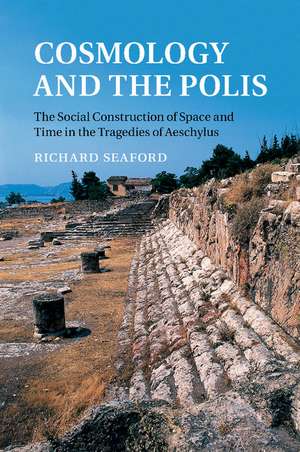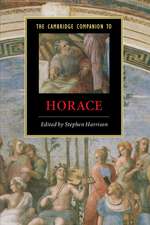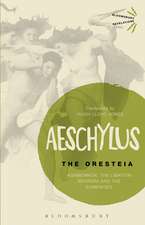Cosmology and the Polis: The Social Construction of Space and Time in the Tragedies of Aeschylus
Autor Richard Seaforden Limba Engleză Paperback – 31 dec 2014
| Toate formatele și edițiile | Preț | Express |
|---|---|---|
| Paperback (1) | 321.52 lei 6-8 săpt. | |
| Cambridge University Press – 31 dec 2014 | 321.52 lei 6-8 săpt. | |
| Hardback (1) | 759.99 lei 6-8 săpt. | |
| Cambridge University Press – 11 ian 2012 | 759.99 lei 6-8 săpt. |
Preț: 321.52 lei
Nou
Puncte Express: 482
Preț estimativ în valută:
61.53€ • 64.00$ • 50.80£
61.53€ • 64.00$ • 50.80£
Carte tipărită la comandă
Livrare economică 15-29 aprilie
Preluare comenzi: 021 569.72.76
Specificații
ISBN-13: 9781107470729
ISBN-10: 1107470722
Pagini: 382
Ilustrații: 1 map
Dimensiuni: 153 x 230 x 22 mm
Greutate: 0.51 kg
Editura: Cambridge University Press
Colecția Cambridge University Press
Locul publicării:New York, United States
ISBN-10: 1107470722
Pagini: 382
Ilustrații: 1 map
Dimensiuni: 153 x 230 x 22 mm
Greutate: 0.51 kg
Editura: Cambridge University Press
Colecția Cambridge University Press
Locul publicării:New York, United States
Cuprins
Introduction; Part I. The Social Construction of Space, Time and Cosmology: 1. Homer: the reciprocal chronotope; 2. Demeter Hymn: the aetiological chronotope; 3. From reciprocity to money; Part II. Dionysiac Festivals: 4. Royal household and public festival; 5. Aetiological chronotope and dramatic mimesis; 6. Monetisation and tragedy; Part III. Limit and the Unlimited in Confrontational Space: 7. Telos and the unlimitedness of money; 8. Suppliants; 9. Septem; 10. Confrontational space in Oresteia; 11. The unlimited in Oresteia; 12. Persians; Part IV. The Unity of Opposites: 13. Form-parallelism and the unity of opposites; 14. Aeschylus and Herakleitos; 15. From the unity of opposites to their differentiation; Part V. Cosmology of the Integrated Polis: 16. Metaphysics and the polis in Pythagoreanism; 17. Pythagoreanism in Aeschylus; 18. Household, cosmos and polis; Appendix: was there a skēnē for all the extant plays of Aeschylus?
Recenzii
'This is an important work that redefines our conception of central categories of early Greek thought: space, time, ritual, and money. It will be of interest to scholars and advanced students working in the areas of classical Greek literature, Greek history, philosophy, and theatre.' Vayos Liapis, The Classical Journal
'The five parts of this ambitious book examine the chronotopes in Homer and archaic Athenian society, money and ritual in the Dionysiac festival, the chronotopes in Aeschylus's plays … the unity of opposites in Aeschylus's theology and Heraclitus's cosmology, and the sociocultural implications of the Pythagorean way of life and Pythagorean opposites in Aeschylus's Oresteia. This brilliant study opens up new vistas on old problems.' J. Bussanich, Choice Review
'The five parts of this ambitious book examine the chronotopes in Homer and archaic Athenian society, money and ritual in the Dionysiac festival, the chronotopes in Aeschylus's plays … the unity of opposites in Aeschylus's theology and Heraclitus's cosmology, and the sociocultural implications of the Pythagorean way of life and Pythagorean opposites in Aeschylus's Oresteia. This brilliant study opens up new vistas on old problems.' J. Bussanich, Choice Review
Notă biografică
Descriere
In the earliest drama the clash between the old world of ritual and the new world of money is revealed.
















